LiverMD Reviews 2024: Is 1MD Liver Supplement Effective?
All articles are produced independently. When you click our links for purchasing products, we earn an affiliate commission. Learn more about how we earn revenue by reading our advertise disclaimer.
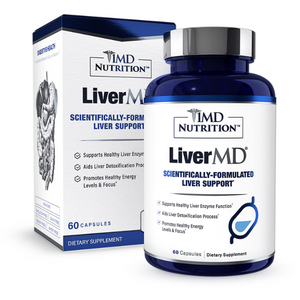
9.8
Quality
9.7
Support Research
9.5
Reputation
8.5
Price
Features
- 2020 NEXTY Award Finalist for ‘Best Condition-Specific Supplement’
- 90-Day unconditional money-back guarantee
- Made in the USA in a Good Manufacturing Practice facility
- Non-GMO ingredients
- Free from peanuts, dairy, wheat, and shellfish
- Clinically-proven ingredients
Brand Information
- Based in Los Angeles
- All supplements designed by doctors
- Rigorously tested for potency and purity
Medical Benefits
- Supports healthy liver enzyme function
- Supports healthy liver detoxification
- Might help with weight management
- Promotes healthy energy levels and focus
- Supports healthy blood sugar balance
Exclusively Discount All Products With Our Above Ambassador Link
About The Brand
LiverMD is a liver support supplement produced by 1MD Nutrition, a company making a range of supplements to support heart, joint, digestive, and immune health. All 1MD supplements are designed by board-certified doctors and backed up with clinical evidence.
LiverMD is one of 1MD Nutrition’s best-selling products. But at up to $49.99 per month (as a one-off purchase), is LiverMD worth the cost? This article covers how LiverMD works to support liver function and the clinical evidence behind the ingredients, plus we look at Liver MD reviews from real customers.
What Is 1MD Nutrition LiverMD?
LiverMD is a dietary supplement providing extracts from superfoods to promote liver health. It’s formulated by one of 1MD Nutrition’s certified physicians and gastroenterologists, Dr. David Kahana.
LiverMD contains highly bioavailable forms of two clinically-proven ingredients for improving liver function: Siliphos®, a superior milk thistle complex, and TocoGaia™, a full-spectrum vitamin E extract.
However, remember that a supplement isn’t a replacement for a healthy diet and lifestyle. LiverMD should be used alongside a healthy diet to improve fatty liver disease.
Feature Product & Coupon

Best Reputation
1MD Nutrition LiverMD
- 2020 NEXTY Award Finalist for ‘Best Condition-Specific Supplement’
- 90-Day unconditional money-back guarantee
- Made in the USA in a Good Manufacturing Practice facility
- Non-GMO ingredients
- Free from peanuts, dairy, wheat, and shellfish
- Clinically-proven ingredients
Exclusively Discount All Products With Our Above Ambassador Link
Does LiverMD Really Work?
On their website, 1MD Nutrition claims that their LiverMD supplement helps “maintain healthy liver function, increasing energy levels and focus while promoting healthy metabolism and overall health.”
Indeed, research suggests that the ingredients in LiverMD can help with nonalcoholic fatty liver and other chronic liver diseases. What’s more, many LiverMD customers claim that their liver enzyme function tests returned to a normal range – some within weeks of taking the supplement.
But is it all good news? Read on to learn about the most common Liver MD reviews and complaints.
Pros
- 2020 NEXTY Award Finalist for “Best Condition-Specific Supplement.”
- 90-Day money-back guarantee.
- Made in the USA.
- Made in a Good Manufacturing Practice facility.
- Non-GMO ingredients.
- Free from peanuts, dairy, wheat, and shellfish.
Cons
- Uses proprietary ingredients.
- Expensive to take on an ongoing basis.
LiverMD Ingredients
LiverMD uses highly bioavailable forms of vitamins and minerals with strong clinical research for improving liver health and reducing the risk of advanced liver diseases.
Many LiverMD customers confirm that their liver function test results improved after starting the supplement, with liver enzyme levels returning to the normal range within weeks to months of taking LiverMD.
But, if you’re not yet convinced, read on to learn about the research behind the ingredients in LiverMD.
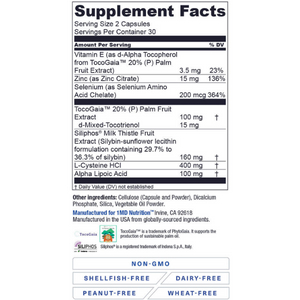
TocoGaia
Vitamin E is an antioxidant and anti-inflammatory nutrient essential for health. However, studies show that people with the nonalcoholic fatty liver disease tend to have a lower dietary intake[1] of this important vitamin. LiverMD uses a “full-spectrum” vitamin E extract called TocoGaia, produced by PhytoGaia.
There are eight forms of vitamin E but that used in dietary supplements tends to be the most common, alpha-tocopherol. However, studies suggest that alpha-tocopherol is not readily bioavailable,[2] meaning it can’t live up to its antioxidant potential.
That’s where TocoGaia comes in. It isn’t just alpha-tocopherol — it’s a complex with all forms including “tocotrienols,” which might be more bioavailable[3] and have a higher antioxidant capacity.[4]
Studies show that nonalcoholic fatty liver disease patients treated with 200 milligrams of tocotrienols[5] vs placebo had significantly higher rates of remission. Similarly, 100 milligrams of tocotrienols taken for three months can reduce “liver stiffness,”[6] a measure of liver fibrosis[7] often seen in those with liver disease.
Supplementing 800 IU of α-tocopherol daily,[1] or about 500 milligrams, is recommended as one of the most important liver support strategies. However, LiverMD only provides 15 milligrams of tocotrienols and 3.5 milligrams of alpha-tocopherol per daily dose, which might not be enough to provide the above benefits.
Siliphos
You’ve probably heard that milk thistle, Silybum marianum, can cure a hangover by improving liver detoxification. But does it actually work?
Milk thistle extract, also known as silymarin, contains a potent antioxidant called silybin. Since the 1970s, we’ve known silybin can maintain healthy liver function[8] via its antioxidant, anti-inflammatory, and antifibrotic effects.[9]
However, like most flavonoids, silymarin and silybin aren’t easily absorbed, which limits their benefits on liver health. That’s why LiverMD encapsulates silybin with phospholipids[10] to make “Siliphos,” a highly bioavailable fat-soluble complex. Clinical research confirms that supplementing Siliphos leads to significantly higher plasma levels of silybin[11] compared to traditional silymarin tablets containing generic milk thistle extract.
But what about Silipohos’ impact on liver health? As silybin also has anti-cancer properties,[12] Siliphos has been given to advanced liver cancer patients[13] who had no other treatment options. However, all the patients died within a couple of months of the start of the trial, so silybin is probably not effective that late in the game. Nevertheless, we can’t rule out the possibility that Silipohos made the patients’ condition worse.
Alpha Lipoic Acid
Alpha lipoic acid, or ALA, is a naturally-occurring antioxidant that might indirectly improve liver health by reducing oxidative damage and inflammation as well as aiding weight loss.
Animal studies suggest ALA can protect the liver from diabetes-induced liver damage[14] by increasing protective antioxidant and anti-inflammatory enzymes. Cell-based studies suggest that ALA can increase glutathione levels[15] — the body’s most potent natural antioxidant[16] — and reduce levels of reactive oxygen species, hence protecting the liver from damage.
However, human clinical trials found that taking 1,200 milligrams of ALA for 12 weeks didn’t improve liver health[17] or liver enzymes relative to a placebo in those with fatty liver disease. Nevertheless, inflammatory IL-6 levels[18] were reduced in obese patients.
So, ALA’s most important contribution to liver health might be weight loss. Studies show ALA can improve insulin sensitivity[17] and optimize leptin levels, our satiety hormone, to promote weight loss.[19] In those who are overweight, losing weight remains the most important strategy to improve liver function.
Unfortunately, LiverMD provides just 100 milligrams of ALA per daily dose, which might not be enough to have any of the above-cited clinical benefits.
Zinc
Zinc is an essential micronutrient with antioxidant properties. The problem is that most people tend to be zinc deficient — especially liver disease patients.[20]
Why? Because the liver plays a crucial role in maintaining healthy zinc levels[21] and, in turn, zinc regulates the activity of liver enzymes. Liver diseases such as liver cirrhosis can lower zinc levels and reduce liver enzyme activity, lowering the liver’s capacity to break down toxic byproducts such as ammonia.
So it makes sense that zinc supplementation can improve liver detoxification in those with nutritional deficiencies. Moreover, studies suggest that zinc supplements improve sarcopenia,[22] i.e., muscle wastage, insulin sensitivity, and oxidative stress[23] in those with chronic liver disease.
LiverMD provides 15 milligrams of zinc as zinc citrate, which is just above the Daily Value of zinc for adults. We don’t have any clinical evidence of the best dose of zinc in liver diseases, so aiming for the Daily Value is a safe bet.
Selenium Amino Acid Chelate
Selenium is critical for liver health because of its antioxidant capacity. It protects the liver from oxidative damage by acting directly as an antioxidant or making essential selenium-dependent antioxidants,[24] such as glutathione.
So it might not be surprising that studies show that those with hepatitis, liver cancer, and liver cirrhosis — but not nonalcoholic fatty liver disease — have significantly lower levels of selenium[25] than the normal population. What’s more, the same study found that higher selenium levels were associated with a 41 percent decrease in the incidence of advanced liver diseases.
So, maintaining healthy selenium levels is important for a healthy liver. But there’s a catch. You need a healthy liver to regulate your selenium levels.[26] This makes supplementing selenium crucial when your liver isn’t functioning as it should.
Minerals such as selenium are often paired with other compounds to increase bioavailability. A “selenium amino acid chelate” is selenium paired with an amino acid, which has been shown to increase bioavailability.
LiverMD provides 200 micrograms of selenium per daily dose. 1MD doesn’t specify the type of selenium-amino acid chelate it uses, but the most common form of selenium/amino acid chelate in dietary supplements[27] is selenomethionine.
Other Ingredients
LiverMD also contains L-cysteine, an amino acid that can be used to make N-acetyl-cysteine[28] in the body, which has antioxidant properties.
Other ingredients include cellulose, dicalcium phosphate, silica, and vegetable oil powder.
Alternatives To 1MD LiverMD
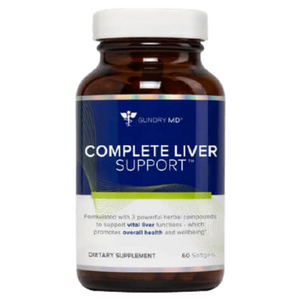
Gundry MD Complete Liver Support
Exclusively Discount All Products With Our Above Ambassador Link
- Natural plant extracts only.
- Much cheaper than LiverMD.
- Also claims to reduce bloating.
- Uses a generic milk thistle extract.
- Includes carrageenan, which can disrupt gut health.
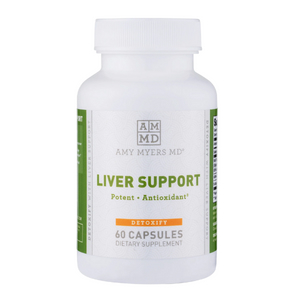
Amy Myers MD Liver Support
- Specifies the form of selenium.
- Cheaper than LiverMD.
- Provides a higher dose of ALA.
- Uses a generic milk thistle extract.
- Includes glutathione instead of precursors (not highly bioavailable).
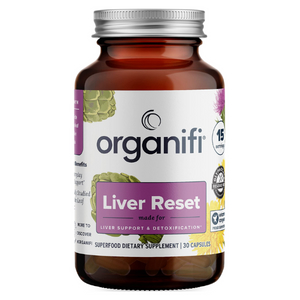
Organifi Liver Reset
- Includes a clinically-studied artichoke leaf extract.
- Mostly organic ingredients.
- No unnecessary excipients.
- Provides a low dose of a generic milk thistle extract.
Health Benefits Of LiverMD
Improved Liver Function
The main health benefit of LiverMD is, of course, improved liver function. Most of the ingredients in LiverMD have been clinically proven to improve liver health and maintain liver function by reducing the risk of liver problems and helping prevent liver damage.
- Vitamin E has been shown to reduce liver “stiffness”[6] and increase remission rates[5] from fatty liver disease.
- Siliphos can increase glutathione levels and protect liver cells from oxidative damage.[9]
- ALA might protect liver cells from diabetes-induced liver damage.[14]
- Zinc might increase the liver’s capacity to metabolize harmful substances such as ammonia.[21]
- Higher selenium levels can reduce the risk of advanced liver disease.[25]
Weight Loss
Studies suggest that improving your liver health can help aid weight management and, vice versa, weight loss can also improve liver function.[29]
Moreover, ALA has been shown to optimize leptin levels and promote weight loss.[19]
Better Blood Sugar Balance
Better blood sugar balance can aid healthy weight management and reduce the risk of type 2 diabetes, which in turn can protect liver health.
Some of the ingredients in LiverMD might improve blood sugar management. For example, studies show that ALA[17] and zinc[23] can independently improve insulin sensitivity.
Lower Inflammation
Most of the ingredients in LiverMD have anti-inflammatory benefits, irrespective of their impact on liver health.
For example, selenium,[30] zinc,[31] and vitamin E[32] all independently act as antioxidants and anti-inflammatories in the body.
However, a recent meta-analysis only found one study of tocotrienol demonstrating a significant anti-inflammatory effect,[33] so we need more research before recommending this form of vitamin E for anti-inflammatory benefits.
Other Health Benefits
Some other health benefits of LiverMD might include:
- Improved immune function.
- Improved detoxification of toxic substances.
- Improved cognition, including focus and clarity.
- Reduced risk of some types of cancer.
Potential Side Effects
While all the ingredients in LiverMD are considered safe for consumption, some of the ingredients have been associated with adverse effects in rare cases, most commonly with excessive consumption.
According to the 1MD website, side effects of taking LiverMD can include:
- Indigestion and bloating
- Abdominal pain
- Diarrhea
- Loss of appetite
- Nausea
- Itching
Selenium Toxicity
Supplementing an extra 200 micrograms of selenium[27] is considered a safe addition to a normal, balanced American diet. However, keep in mind that the amount of selenium in this supplement is over three times the recommended DV. Selenium toxicity — also called selenosis[34] — is a risk if you’re overconsuming selenium from other sources, such as Brazil nuts.
The body can’t easily get rid of excess selenium, which accumulates and can cause damage[24] to organs such as the pancreas and kidneys, increasing the risk of chronic diseases like type 2 diabetes or kidney disease.[35]
Dosage
1MD recommends taking LiverMD as a dietary supplement alongside a healthy, balanced diet and lifestyle. Adults are recommended to take two capsules, once a day, preferably with a meal for optimal absorption.
LiverMD Reviews: What Do Real Users Say?
Here are the most common Liver MD reviews and complaints from verified customers on 1md.org and amazon.com.
I have been using this product for quite some time now…When my doctor first started doing blood work to check my liver, she recommended I try a supplement to help support it. She has been very impressed with all the tests she has done since I started using the Liver MD and has told me to continue doing whatever I am doing because it is working. I told her what I was using and she said she was going to recommend it to some of her other patients. This is an amazing product and I highly recommend it to help keep your liver healthy.
Charlene W.
I have been using LiverMD for over a year. It definitely works! My blood work indicates that my liver enzymes are within the normal range…
Linda R.
I found this and figured it’s worth a shot and was pleasantly surprised at just how well it works. My liver functions are back to normal, and I’m thrilled. I would undoubtedly endorse this for anyone who wanted to know about it.
Mohammad B.
OMG in less than a week of taking this supplement, as prescribed, my AST and ALT are within NORMAL range after so long! My Dr was so surprised that I had to show her what I was taking.
Maria I.
Final Thought: Is LiverMD Worth Buying?
LiverMD is a well-formulated liver support supplement with plenty of clinical evidence to back up the claims made by the company, 1MD Nutrition.
After researching the ingredients in LiverMD and reading many Liver MD reviews by real customers, we would recommend this supplement to people with chronic liver issues such as nonalcoholic fatty liver disease.
However, LiverMD should be taken alongside a healthy diet and lifestyle with regular exercise to maintain a healthy weight. Nonalcoholic fatty liver disease is strongly linked with obesity,[36] so the first-line intervention for managing the fatty liver disease is weight loss. Of course, keeping alcohol consumption to a minimum is crucial to support a healthy liver.
Frequently Asked Questions
LiverMD is likely a good supplement to take if you have liver issues.
Side effects are rare when LiverMD is taken at the recommended daily dose but can include digestive symptoms, loss of appetite, nausea, and itching.
For most people, LiverMD should be safe to take. However, always consult your healthcare practitioner before starting a new dietary supplement.
Dietary supplements are not FDA-approved.
+ 36 sources
Health Canal avoids using tertiary references. We have strict sourcing guidelines and rely on peer-reviewed studies, academic researches from medical associations and institutions. To ensure the accuracy of articles in Health Canal, you can read more about the editorial process here
- Plauth, M., Bernal, W., Dasarathy, S., Merli, M., Plank, L.D., Schütz, T. and Bischoff, S.C. (2019). ESPEN guideline on clinical nutrition in liver disease. Clinical Nutrition, [online] 38(2), pp.485–521. doi:10.1016/j.clnu.2018.12.022.
- Mohd Zaffarin, A.S., Ng, S.-F., Ng, M.H., Hassan, H. and Alias, E. (2020). Pharmacology and Pharmacokinetics of Vitamin E: Nanoformulations to Enhance Bioavailability. International Journal of Nanomedicine, [online] Volume 15, pp.9961–9974. doi:10.2147/ijn.s276355.
- Al-Baiaty, F.D.R., Ismail, A., Abdul Latiff, Z., Muhammad Nawawi, K.N., Raja Ali, R.A. and Mokhtar, N.M. (2021). Possible Hepatoprotective Effect of Tocotrienol-Rich Fraction Vitamin E in Non-alcoholic Fatty Liver Disease in Obese Children and Adolescents. Frontiers in Pediatrics, [online] 9. doi:10.3389/fped.2021.667247.
- Serbinova, E., Kagan, V., Han, D. and Packer, L. (1991). Free radical recycling and intramembrane mobility in the antioxidant properties of alpha-tocopherol and alpha-tocotrienol. Free Radical Biology and Medicine, [online] 10(5), pp.263–275. doi:10.1016/0891-5849(91)90033-y.
- Magosso, E., Ansari, M.A., Gopalan, Y., Shuaib, I.L., Wong, J.-W., Khan, N.A.K., Abu Bakar, M.R., Ng, B.-H. and Yuen, K.-H. (2013). Tocotrienols for normalisation of hepatic echogenic response in nonalcoholic fatty liver: a randomised placebo-controlled clinical trial. Nutrition Journal, [online] 12(1). doi:10.1186/1475-2891-12-166.
- Thendiono, E. (2018). IDDF2018-ABS-0025 The effect of vitamin e (mixed tocotrienol) on the liver stiffness measurement measured by transient elastography (FIBROSCAN) among nafld patients. Clinical Hepatology. [online] doi:10.1136/gutjnl-2018-iddfabstracts.189.
- Bataller, R. and Brenner, D.A. (2005). Liver fibrosis. Journal of Clinical Investigation, [online] 115(2), pp.209–218. doi:10.1172/jci24282.
- Bijak, M. (2017). Silybin, a Major Bioactive Component of Milk Thistle (Silybum marianum L. Gaernt.)—Chemistry, Bioavailability, and Metabolism. Molecules, [online] 22(11), p.1942. doi:10.3390/molecules22111942.
- Serviddio, G., Bellanti, F., Giudetti, A.M., Gnoni, G.V., Petrella, A., Tamborra, R., Romano, A.D., Rollo, T., Vendemiale, G. and Altomare, E. (2009). A Silybin-Phospholipid Complex Prevents Mitochondrial Dysfunction in a Rodent Model of Nonalcoholic Steatohepatitis. Journal of Pharmacology and Experimental Therapeutics, [online] 332(3), pp.922–932. doi:10.1124/jpet.109.161612.
- Tong, Y., Zhang, Q., Shi, W. and Wang, J. (2019). Mechanisms of oral absorption improvement for insoluble drugs by the combination of phospholipid complex and SNEDDS. Drug Delivery, [online] 26(1), pp.1155–1166. doi:10.1080/10717544.2019.1686086.
- Méndez-Sánchez, N., Dibildox-Martinez, M., Sosa-Noguera, J., Sánchez-Medal, R. and Flores-Murrieta, F.J. (2019). Superior silybin bioavailability of silybin–phosphatidylcholine complex in oily-medium soft-gel capsules versus conventional silymarin tablets in healthy volunteers*. BMC Pharmacology and Toxicology, [online] 20(1). doi:10.1186/s40360-018-0280-8.
- Lazzeroni, M., Petrangolini, G., Legarreta Iriberri, J.A., Pascual Avellana, J., Tost Robusté, D., Cagnacci, S., Macis, D., Aristarco, V., Bonanni, B., Morazzoni, P., Johansson, H. and Riva, A. (2020). Development of an HPLC-MS/MS Method for the Determination of Silybin in Human Plasma, Urine and Breast Tissue. Molecules, [online] 25(12), p.2918. doi:10.3390/molecules25122918.
- Siegel, A.B., Narayan, R., Rodriguez, R., Goyal, A., Jacobson, DrPH, J.S., Kelly, K., Ladas, E., Lunghofer, P.J., Hansen, R.J., Gustafson, D.L., Flaig, T.W., Yann Tsai, W., Wu, D.P.H., Lee, V. and Greenlee, H. (2013). A Phase I Dose-Finding Study of Silybin Phosphatidylcholine (Milk Thistle) in Patients With Advanced Hepatocellular Carcinoma. Integrative Cancer Therapies, [online] 13(1), pp.46–53. doi:10.1177/1534735413490798.
- Dugbartey, G.J., Alornyo, K.K., Adams, I., Atule, S., Obeng-Kyeremeh, R., Amoah, D. and Adjei, S. (2022). Targeting hepatic sulfane sulfur/hydrogen sulfide signaling pathway with α-lipoic acid to prevent diabetes-induced liver injury via upregulating hepatic CSE/3-MST expression. Diabetology & Metabolic Syndrome, [online] 14(1). doi:10.1186/s13098-022-00921-x.
- Gu, L., Li, S., Bai, J., Zhang, Q. and Han, Z. (2020). α‐Lipoic acid protects against microcystin‐LR induced hepatotoxicity through regeneration of glutathione via activation of Nrf2. Environmental Toxicology, [online] 35(7), pp.738–746. doi:10.1002/tox.22908.
- Pizzorno, J. (2014). Glutathione! Integrative medicine (Encinitas, Calif.), [online] 13(1), pp.8–12. Available at: https://www.ncbi.nlm.nih.gov/pmc/articles/PMC4684116/
- Rahmanabadi, A., Mahboob, S., Amirkhizi, F., Hosseinpour-Arjmand, S. and Ebrahimi-Mameghani, M. (2019). Oral α-lipoic acid supplementation in patients with non-alcoholic fatty liver disease: effects on adipokines and liver histology features. Food & Function, [online] 10(8), pp.4941–4952. doi:10.1039/c9fo00449a.
- Hosseinpour-Arjmand, S., Amirkhizi, F. and Ebrahimi-Mameghani, M. (2018). The effect of alpha-lipoic acid on inflammatory markers and body composition in obese patients with non-alcoholic fatty liver disease: A randomized, double-blind, placebo-controlled trial. Journal of Clinical Pharmacy and Therapeutics, [online] 44(2), pp.258–267. doi:10.1111/jcpt.12784.
- Kucukgoncu, S., Zhou, E., Lucas, K.B. and Tek, C. (2017). Alpha-lipoic acid (ALA) as a supplementation for weight loss: results from a meta-analysis of randomized controlled trials. Obesity Reviews, [online] 18(5), pp.594–601. doi:10.1111/obr.12528.
- Katayama, K. (2020). Zinc and protein metabolism in chronic liver diseases. Nutrition Research, [online] 74, pp.1–9. doi:10.1016/j.nutres.2019.11.009.
- Himoto, T. and Masaki, T. (2018). Associations between Zinc Deficiency and Metabolic Abnormalities in Patients with Chronic Liver Disease. Nutrients, [online] 10(1), p.88. doi:10.3390/nu10010088.
- Nishikawa, H., Asai, A. and Fukunishi, S. (2022). The Significance of Zinc in Patients with Chronic Liver Disease. Nutrients, [online] 14(22), p.4855. doi:10.3390/nu14224855.
- Coni, P., Pichiri, G., Lachowicz, J.I., Ravarino, A., Ledda, F., Fanni, D., Gerosa, C., Piras, M., Coghe, F., Gibo, Y., Cau, F., Castagnola, M., Van Eyken, P., Saba, L., Piludu, M. and Faa, G. (2021). Zinc as a Drug for Wilson’s Disease, Non-Alcoholic Liver Disease and COVID-19-Related Liver Injury. Molecules, [online] 26(21), p.6614. doi:10.3390/molecules26216614.
- Rahmanto, A.S. and Davies, M.J. (2012). Selenium-containing amino acids as direct and indirect antioxidants. IUBMB Life, [online] 64(11), pp.863–871. doi:10.1002/iub.1084.
- Lin, Y., He, F., Lian, S., Xie, B., Liu, T., He, J. and Liu, C. (2022). Selenium Status in Patients with Chronic Liver Disease: A Systematic Review and Meta-Analysis. Nutrients, [online] 14(5), p.952. doi:10.3390/nu14050952.
- Burk, R.F. and Hill, K.E. (2015). Regulation of Selenium Metabolism and Transport. Annual Review of Nutrition, [online] 35(1), pp.109–134. doi:10.1146/annurev-nutr-071714-034250.
- Schrauzer, G.N. (2001). Nutritional Selenium Supplements: Product Types, Quality, and Safety. Journal of the American College of Nutrition, [online] 20(1), pp.1–4. doi:10.1080/07315724.2001.10719007.
- Medlineplus.gov. (2022). N-Acetyl Cysteine (NAC): MedlinePlus Supplements. [online] Available at: https://medlineplus.gov/druginfo/natural/1018.html
- Hoofnagle, J.H., Van Natta, M.L., Kleiner, D.E., Clark, J.M., Kowdley, K.V., Loomba, R., Neuschwander-Tetri, B.A., Sanyal, A.J. and Tonascia, J. (2013). Vitamin E and changes in serum alanine aminotransferase levels in patients with non-alcoholic steatohepatitis. Alimentary Pharmacology & Therapeutics, [online] 38(2), pp.134–143. doi:10.1111/apt.12352.
- Hariharan, S. and Dharmaraj, S. (2020). Selenium and selenoproteins: it’s role in regulation of inflammation. Inflammopharmacology, [online] 28(3), pp.667–695. doi:10.1007/s10787-020-00690-x.
- Olechnowicz, J., Tinkov, A., Skalny, A. and Suliburska, J. (2017). Zinc status is associated with inflammation, oxidative stress, lipid, and glucose metabolism. The Journal of Physiological Sciences, [online] 68(1), pp.19–31. doi:10.1007/s12576-017-0571-7.
- Lewis, E.D., Meydani, S.N. and Wu, D. (2018). Regulatory role of vitamin E in the immune system and inflammation. IUBMB Life, [online] 71(4), pp.487–494. doi:10.1002/iub.1976.
- Khor, B.-H., Tiong, H.-C., Tan, S.C., Wong, S.K., Chin, K.-Y., Karupaiah, T., Ima-Nirwana, S. and Abdul Gafor, A.H. (2021). Effects of tocotrienols supplementation on markers of inflammation and oxidative stress: A systematic review and meta-analysis of randomized controlled trials. PLOS ONE, [online] 16(7), p.e0255205. doi:10.1371/journal.pone.0255205.
- Govt.nz. (2022). Selenium. [online] Available at: https://www.medsafe.govt.nz/profs/puarticles/sel.htm
- Fu, S., Zhang, L., Ma, F., Xue, S., Sun, T. and Xu, Z. (2022). Effects of Selenium on Chronic Kidney Disease: A Mendelian Randomization Study. Nutrients, [online] 14(21), p.4458. doi:10.3390/nu14214458.
- Younossi, Z.M., Corey, K.E. and Lim, J.K. (2021). AGA Clinical Practice Update on Lifestyle Modification Using Diet and Exercise to Achieve Weight Loss in the Management of Nonalcoholic Fatty Liver Disease: Expert Review. Gastroenterology, [online] 160(3), pp.912–918. doi:10.1053/j.gastro.2020.11.051.



